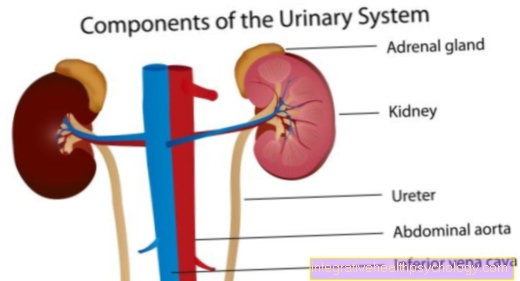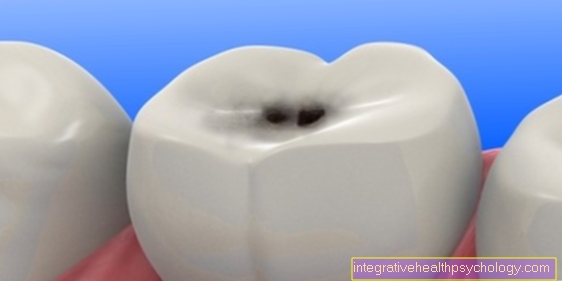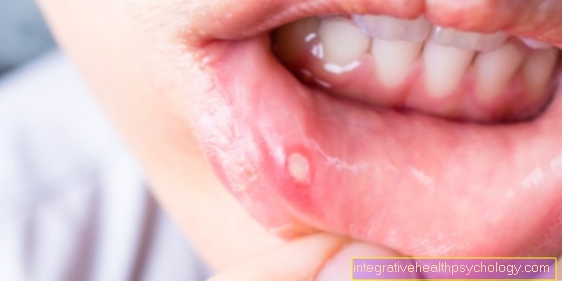Tongue cancer
definition
Tongue cancer is a malignant, rarely occurring ulcer that originates from the tongue. The mucous membrane of the tongue consists mainly of uncornified squamous epithelium. Since most tumors develop from it, they are also known as squamous cell carcinoma. Tongue carcinomas are included in the large group of head and neck tumors.
For general information on getting started, we recommend our page on: Squamous Cell Carcinoma - What is it?

The tongue is divided into the front two thirds, which rest against the roof of the mouth when the mouth is closed, and the solid rear third, which points to the throat and extends down to the epiglottis. This third is called the tongue base.
The distribution of tongue cancer is as follows:
- Over half in the middle third on the edge of the tongue
- about a quarter in the front third of the tongue
- a fifth at the base of the tongue.
There is a subdivision of tumors into flat tongue cancers that grow in the mucous membrane and those that grow like cauliflower over the squamous epithelium.
The 5-year survival rate is 60 - 80% depending on the tumor stage.
Also read: Squamous Cell Carcinoma - How Dangerous Is It?
Symptoms of tongue cancer
As with most malignant diseases, tongue cancer has no unique or typical symptoms that are solely caused by this disease. Rather, there are usually several unspecific complaints, each of which is more likely to have harmless causes.
- localized hardening (hardening that slowly gets bigger)
- open areas (wound that no longer heals)
- Lump feeling in the throat
- slurred language
- increased salivation
- Pain in the tongue itself or in the throat
- reduced mobility of the tongue
- Difficulty swallowing
- putrid smell
- Bleeding in the mouth
Read on below: These are the symptoms you can tell cancer of the tongue
Sore throat and difficulty swallowing
Sore throats and difficulty swallowing are among the most common complaints.In the vast majority of cases, a harmless disease is hidden behind the symptoms, which heals itself within a few days to a few weeks without treatment. In the vast majority of cases, the symptoms are based on a harmless viral infection, which is best cured by physical rest and sufficient amounts of water and warm neck wraps.
In only a few cases, however, the symptoms are based on a disease that should be treated specifically. Malignant diseases such as tongue cancer make up a fraction of this. Cancer of the tongue should therefore not be considered immediately if a new sore throat or difficulty swallowing occurs. However, if the symptoms persist for more than two weeks or keep getting worse, clarification of the cause is advisable.
Bad breath in tongue cancer
Many people suffer from bad breath, which can have various causes. Poor oral hygiene often leads to the development of bad-smelling breath. In a few cases, the symptom is due to a treatable disease such as a bulging esophagus.
A malignant disease such as tongue cancer can also express itself through bad breath, among other things. However, this usually only occurs at an advanced stage, when a cancer that has existed for a long time disintegrates. Conversely, tongue cancer is the cause of the bad breath symptom only in extremely rare cases.
However, if bad breath occurs and persists despite good oral hygiene, a visit to a doctor may be indicated to clarify a possible treatable cause.
Bleeding from tongue cancer
Tongue cancer can lead to bleeding in the mouth, starting directly from the cancerous sore or when it grows into a blood vessel and opens it. In general, however, in most cases blood in the mouth comes from the gums, which can often be attributed to inadequate oral hygiene.
The dentist should be asked about the symptom during the recommended six-monthly check-up. However, if unexplained bleeding in the oral cavity occurs more frequently, an early examination by your doctor may be indicated. Even if tongue cancer is very rare as a cause, early detection is all the more important.
Tongue pain in tongue cancer
Tongue pain can have various causes, but in most cases it is harmless and only rarely is there a disease that requires treatment. Tongue cancer, which is rare, is the cause in only a fraction of cases.
In addition to pain, however, a protrusion or a non-healing wound on the tongue can often be felt or seen in a mirror image.
Much more often, tongue pain, for example, is based on a canker sore. This is a small inflammation in the mouth. However, often no clear cause of the symptom can be determined. In women, due to an increase in tongue pain during menopause, it is believed to be related to hormonal changes.
Learn more about this at: Canker sores
Increased salivation in tongue cancer
Increased salivation is a nonspecific symptom that can have a number of causes, most of which are harmless.
A malignant disease such as tongue cancer can, among other things, lead to an increase in saliva production, but then, as a rule, other complaints also occur and the tumor can be recognized in the area of the tongue or at least felt as a hardening or bulging.
Cancer of the tongue should therefore not be thought of immediately if there is increased salivation. If the symptom persists for more than two weeks, it is appropriate to see a doctor to determine a possible cause.
Detect early-stage tongue cancer
As with many tumor diseases, tongue cancer is usually not easy to spot. The possible complaints are unspecific and harmless causes are more likely.
Tongue cancer often develops on the side of the tongue. A hardening, bump or open area that does not go away on its own should be examined, even if the all-clear can often be given. Often, however, tongue cancer is not easy to recognize in the early stages because the tumor develops in the back of the tongue, which is usually not easy to see.
Due to the narrow anatomical conditions, this can also manifest itself early on in the form of discomfort when swallowing or a feeling of foreign bodies in the throat. In addition to the described growths on the tongue, a tongue coating that is limited to an area that appears unusual should also be examined by a doctor. Large, flat deposits on almost the entire tongue can look threatening, but usually there is no tongue cancer hidden behind them.
A possible typical cause is an infection of the tongue by the skin fungus Candida albicans. This is also known as thrush. In such a case, however, it is also advisable to see a doctor to have the infection treated.
When detecting tongue cancer in the early stages, one should also be aware that the disease is rather rare and in most cases affects older people, smokers and those with poor oral hygiene and frequent infections in the oral cavity. It is extremely unlikely, but not excluded, that a young person who does not smoke and brush their teeth regularly will develop tongue cancer.
also read: Oral thrush
End-stage tongue cancer
What tongue cancer looks like in the end-stage cannot be described in general terms, as the disease can develop in different courses and forms. Typically, the more advanced the tongue cancer, the larger the ulcer. Swallowing, speaking, and breathing can be difficult. In addition, parts of the cancerous ulcer can break down, which can lead to a foul odor and bleeding in the mouth. The likelihood that the tumor has metastasized to the rest of the body is quite high in the terminal stages.
Depending on the location and size of the tongue cancer, parts of the tongue may have to be removed so that speaking and swallowing can also be impaired. If the ability to swallow is completely lost, artificial nutrition, for example through a gastric tube inserted through the abdominal wall, may even be necessary.
As with other end-stage tumors, tongue cancer can lead to the person affected losing a lot of weight and looking emaciated and emaciated. In addition, if radiation or chemotherapy was or is part of treatment, patients typically lose their scalp hair.
You might also be interested in: What is the life expectancy with tongue cancer?
causes
Why tongue cancer develops is not yet fully understood. However, it has certainly been established that external influences play a role. For example, the consumption of tobacco (especially in the form of pipe smoking) and the accompanying excessive consumption of alcohol seem to have a major influence on the development of tongue cancer.
Drugs can also have a damaging effect on the tongue epithelium, i.e. promote the development of tongue cancer. Inadequate oral hygiene and chronic inflammation of the tongue mucous membrane, which e.g. caused by poorly fitting dentures also increase the likelihood of tongue cancer.
In the area of leukoplakia (severe keratinization of the squamous epithelium of the tongue, which is a precancerous condition), squamous cell carcinomas (a type of tongue cancer) are more common.
Also read: Squamous Cell Carcinoma - How Dangerous Is It?
Tongue cancer from HPV
The “human papillomavirus” is called “HPV”. There are over 150 different types of human papillomavirus, only a few of which increase the risk of various cancers. These so-called “high-risk” types include HPV 16, 18, 45 and 31, for example.
After infection, they increase the risk of developing various types of cancer of the mouth, throat and genitals. While there is a clear connection between the viral infection and the disease in cervical cancer, in the case of tongue cancer and other cancers of the oral cavity it is still under discussion whether an infection with HPV is a possible cause.
It is currently not known how high the risk is of developing tongue cancer from an HPV infection. However, it is rated as rather low. Much more common triggers are smoking and alcohol consumption.
HPV is usually transmitted through skin or mucous membrane contact during sex. Oral sex in particular can cause the pathogens to spread in the mouth and throat as well as on the tongue. In addition, HP viruses can also be transmitted through shared towels or toothbrushes.
Human papillomaviruses are generally very widespread. Approx. 2/3 of all people will get an infection during their lifetime. This is usually not noticed and heals after a few months without consequences. Since the viruses are transmitted very easily, both partners are usually infected in a short time. The risk of infection can be reduced by using condoms.
Find out more at: HPV - You should know that!
diagnosis
The doctor starts the diagnosis with an anamnesis, whereby the symptoms of the complaint should be explained. This is followed by a thorough physical exam.
The front two thirds of the tongue can be seen with the naked eye.
The back third of the tongue can be seen with a mirror examination. If tongue cancer is diagnosed, the inspection reveals ulcerations on the edge of the tongue, on its back or on the base of the tongue. During palpation, the palpation of the tongue, the area around the ulcerations is very hard due to infiltration.
Typically, cancer of the tongue, or suspicion of it, is discovered by the dentist, since in the best case, he sees the patient twice a year for checks and has deviations clarified.
The patient also expresses severe pain. To confirm the diagnosis, a biopsy, a small sample, is taken from the suspicious structures, which is used for a tissue examination. A
- Ultrasound examination of the tongue and cervical lymph nodes
- Computed tomography or
- Magnetic resonance imaging
serve to further confirm the diagnosis of tongue cancer. This examination is followed by the staging of the tongue tumor, i.e. a division into stages for the tongue cancer.
Read more about the topic here biopsy
Which doctor treats tongue cancer?
Tongue cancer is one of the diseases of the mouth and throat and is therefore a disease that can be assigned to both oral and maxillofacial surgeons and the field of ear, nose and throat medicine.
Since surgery and, if necessary, radiation or chemotherapy are usually carried out, the doctors treating this disease are usually hospital doctors from various specialist areas. Radiation is carried out in cooperation with radiation doctors from the field of radiology.
The follow-up examinations can also be carried out or coordinated by a resident ENT specialist or the family dentist. As a rule, the family doctor is also significantly involved in the holistic treatment of a person suffering from tongue cancer.
In the case of a stage of the disease with no prospect of a cure, treatment by a palliative care practitioner may also make sense, who strives for the best possible relief or control of symptoms through medical measures.
You can read more information about the topic in the next article: Squamous cell carcinoma of the tongue
treatment
For the treatment of tongue cancer, both operational procedures as well as radiation technology methods to disposal. They can be used individually or in combination to treat tongue cancer. However, this depends on the type of tumor and its stage, which is why prior staging is essential.
The surgery for tongue cancer
For the surgical removal of the tumor, the exact location, the extent of the tumor, the metastasis in neighboring organs and in lymph nodes through previous diagnostics are important, since the extent of an operation for tongue cancer depends on this. It is about small tumors in the area of movable part of the tongue, these are removed with a sufficient safety margin without complications.
The in Tongue base Tongue carcinomas that are located and that even spread to neighboring structures are presented as extremely difficult to operate This often requires extensive surgery, where parts of the tongue and the Lower jaw to be operated out with.
If the cervical lymphatics are also affected, a Neck clearance be done with the whole Lymphatic system one side of the neck, the jugular vein, the sternocleidomastoid muscle (the head turner) and the fatty tissue must be completely removed. The resulting tissue defects are covered by flaps and grafts.
For advanced tongue cancer, where Lymph node metastases are present or that could only be partially removed surgically, a subsequent one is carried out radiotherapywhich should increase the chances of recovery.
Treatment using radiation therapy
The radiotherapy is divided into primary and postoperative radiation therapy. Depending on the type of tongue cancer and how far it has progressed, one or the other method of radiation is chosen.
To a primary radiation therapy This is the case when radiation alone is used to cure cancer.
It is particularly useful in the early stages of tongue cancer. The cervical lymph nodes are after Risk of metastasis included in the irradiation, but no neck clearance takes place here.
Patients under a
- widespread form of tongue cancer
- Lymph node metastases and
- incompletely removed tumors
suffer, get one postoperative radiation therapy. Treatment should take place soon after the operation. The postoperative radiation is done with lower doses than the primary.
Possible complication
In patients with tongue cancer, there is a high risk of secondary cancers of the mouth and throat. During follow-up care, great care is taken to ensure that the nasopharynx and mouth are properly displayed.
Cancer of the palate is one of the carcinomas of the oral cavity. In the following article, you will find out how to recognize palatal cancer and how it is treated if you are present: Palate Cancer - Things to Watch Out For
Treatment without surgery
In order to remove a tongue carcinoma and thus initiate healing, an operation must inevitably take place. For some years now, in various cases, the Chemo- and the radiotherapy used. In most cases, a combination of these 3 procedures is the best solution - even today the treatment almost never gets by without an operation. The therapy variant without surgery and only with radiation and chemotherapy is primarily used in the advanced, inoperable stages of tongue cancer.
In current treatment concepts, a combination out Irradiation and chemotherapy to the surgical removal of the tumor in order to improve the chances of a cure and to reduce the risk of the tongue cancer occurring again. Surgery on larger tumors can severely reduce the quality of life by removing the tongue, lower jaw, or other parts of the face that are important for speaking. In these cases, attempts are usually made to shrink the tumor with radiation or the appropriate chemotherapy before the operation, since less tissue then has to be removed - but the operation itself cannot be avoided.
If a patient decides against an operation, although it is possible, this usually means a significantly worse prognosis and a shorter life expectancy.
forecast
The prognosis for people with tongue cancer depends on a number of factors. It is strongly influenced by that stagein which tongue cancer is discovered and treated. The stage depends on size and the presence of Tumor settlements in other organs or the lymph nodes.
If tongue cancer is discovered at an early stage and treated quickly, the prognosis is usually very good.However, has the ulcer had enough time to Daughter tumors the prognosis is significantly worse. If tumor settlements occur in lymph nodes, the prognosis is better if only a few lymph nodes are affected.
Can in addition Daughter tumors in other Organs again lung, of the liver or in bone to be found is that Life expectancy mostly just low. Another important factor in forecasting is that Localization of the tumor. Tongue cancer that occurs on the base of the tongue - that is, far back in the mouth, near the throat - usually has a worse prognosis than tumors on the rest of the tongue. The reason for this is that it later leads to symptoms and is not as clearly visible as tumors in other places.
Other factors such as the quality and extent of the operation, as well as the recurrence of the tumor after it has already disappeared due to the therapy, also influence the prognosis.
What is the life expectancy for tongue cancer
Life expectancy in people with tongue cancer depends heavily on factors such as the stage of the tumor, the therapy and the sex of the person with the disease. It must be noted that people often survive for different lengths of time despite almost identical tongue cancer and very similar physical conditions. It is therefore not possible to predict how long a patient will live in individual cases. The following data are only averages. They do not show that some patients survive significantly longer, while others survive significantly shorter.
If one calculates the average lifespan of all previous patients with tongue cancer, without considering whether and how they were treated or what stage it was, then the life expectancy after diagnosis is approx. 9 years.
Patients who received optimal treatment survive on average about 10 years - here, however, no differentiation is made as to the stage of the tongue cancer. Patients who did not receive an operation because they could not have physically survived it, rejected it or because the tumor was too advanced, survived an average of 2 years.
In addition to all these values, it should be mentioned that regardless of all factors, approx. 38-50% of all tongue cancer patients are still alive 10 years after the diagnosis. Women usually survive longer than men. How good or bad the quality of life is in the years following the diagnosis of "tongue cancer" cannot be seen from these figures and can vary greatly from person to person.
Read more about this: Life expectancy in tongue cancer
Prevention
The Risk factorsdiagnosed as developing tongue cancer should be discontinued. These include: the excessive alcohol consumption, the, Smoke especially pipe smoking drug consumption, such as poor oral hygiene.
Is Tongue Cancer Contagious?
Tongue cancer is not contagious. Direct transmission cannot occur through touch or other contact with a sick person.
The fear of infection can, however, arise from an incorrect understanding of the context of the disease. It is believed that certain viruses (HPV) play a role in the development of tongue cancer. These are quite contagious and can be transmitted through close physical contact such as sexual intercourse.
Nevertheless, on the one hand, many healthy people also carry these viruses and, on the other hand, smoking and alcohol consumption are significantly more significant risk factors for the development of tongue cancer than infection with HPV. It is therefore inappropriate to stay away from someone with tongue cancer because of the apparent risk of infection.























.jpg)





